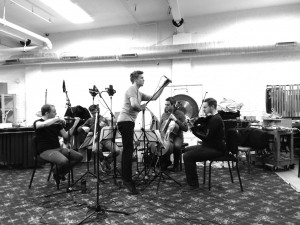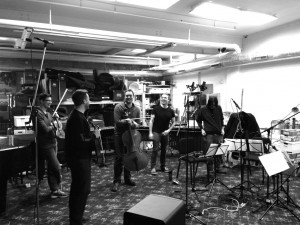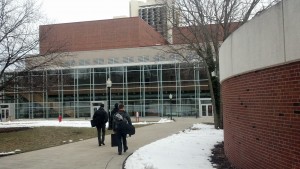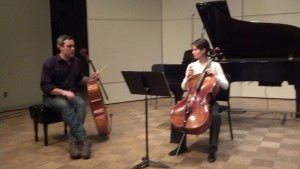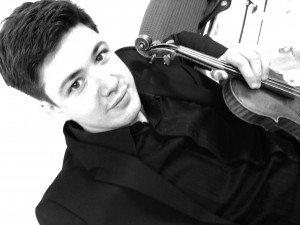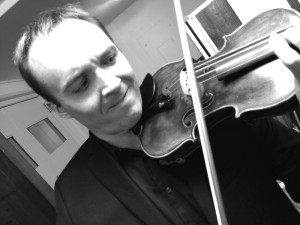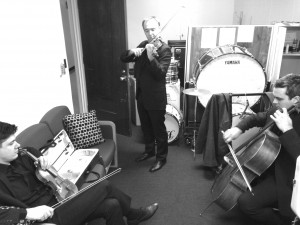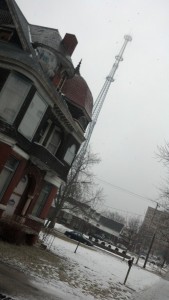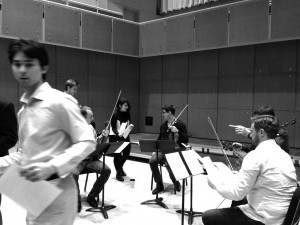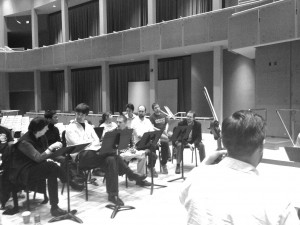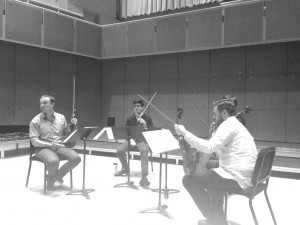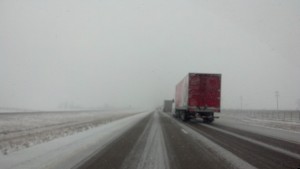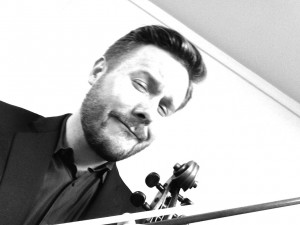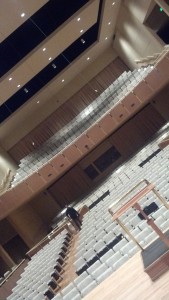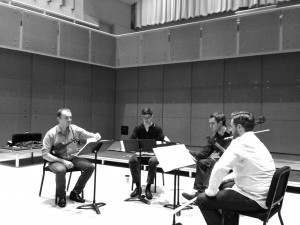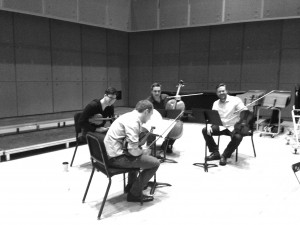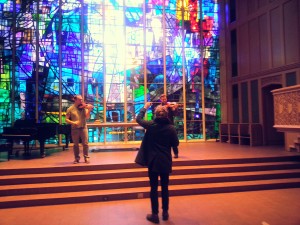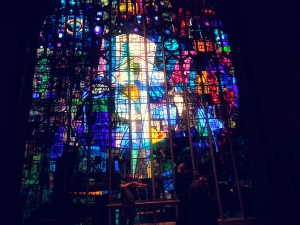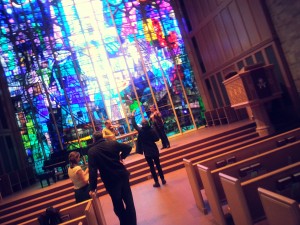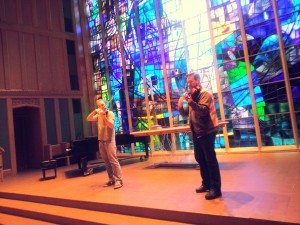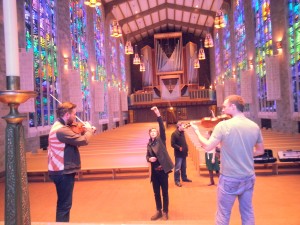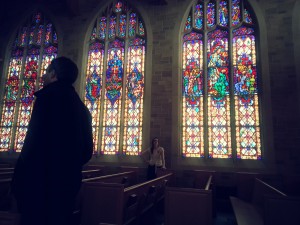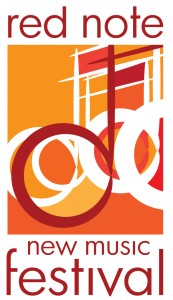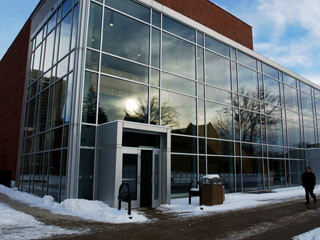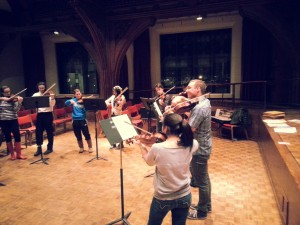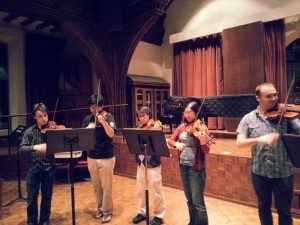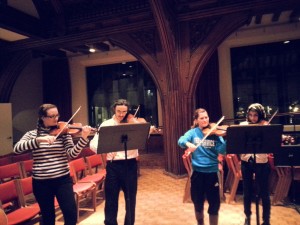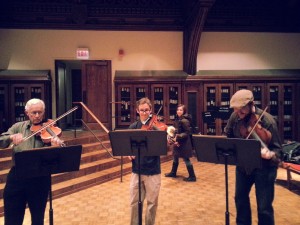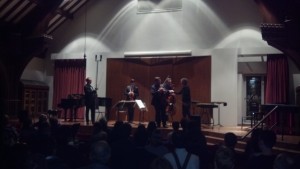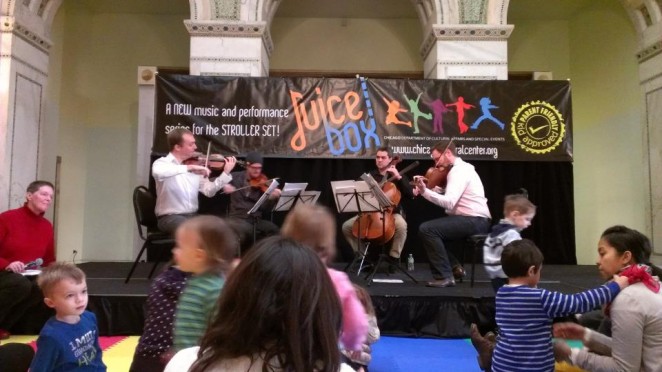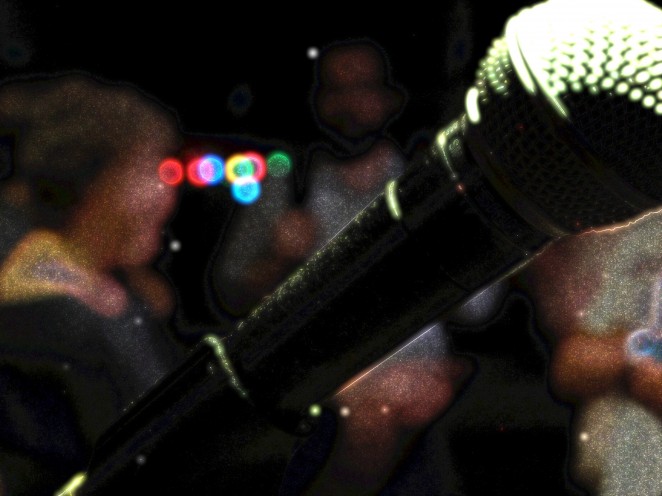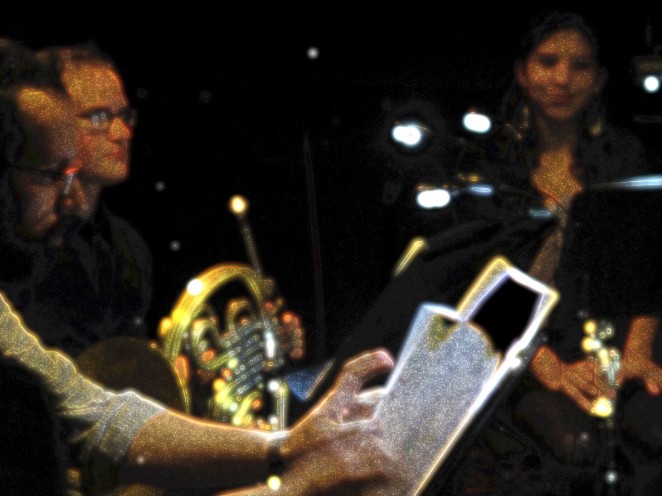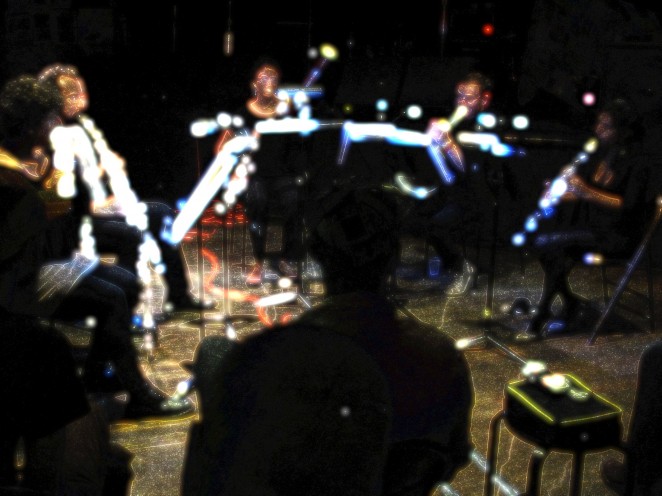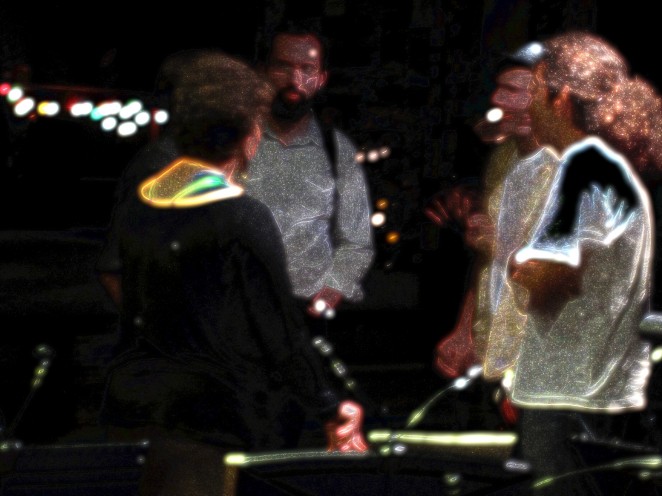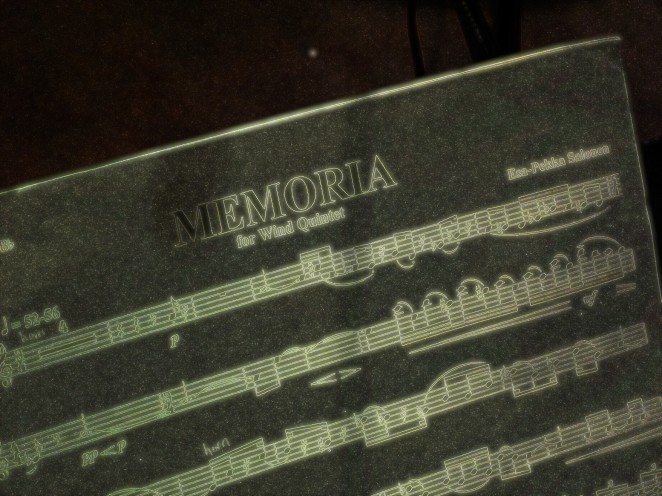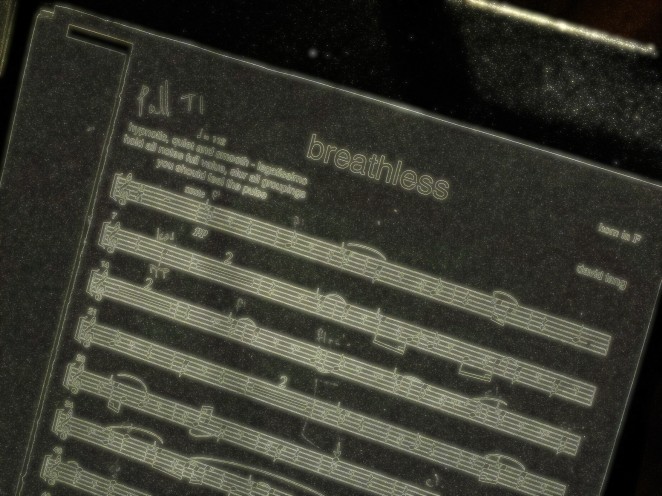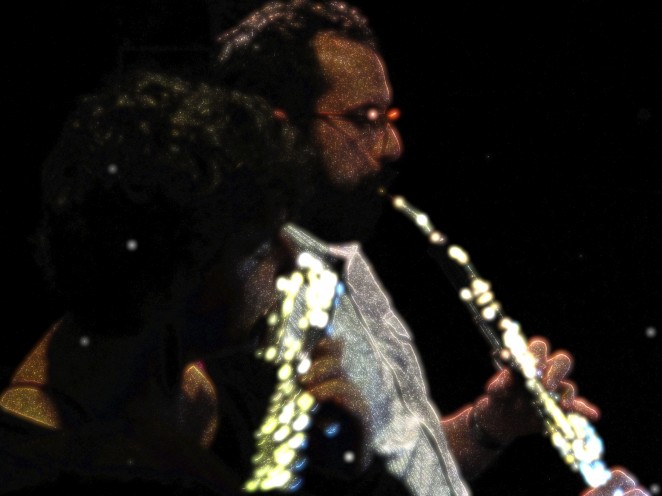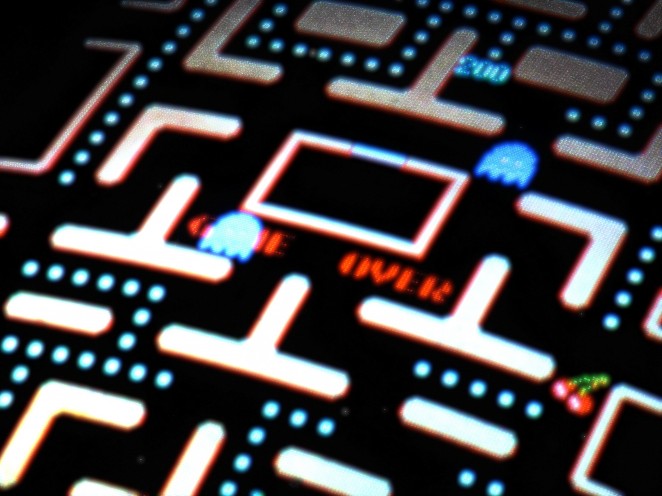I began exploring Haydn's Seven Last Words of Christ by researching the history of the work's inception, revisions, and publication. Since there were many different arrangements of the work during Haydn's own lifetime (for orchestra, solo piano, string quartet, and choir), there were a lot of places one could start and a lot of resources to refer to. Since I didn't want to radically reinterpret the quartet treatment, I used the Trautwein plates of the string quartet version as a point of embarkation and began entering that score, in its entirety, into Finale. I received some assistance with this step from my friend and copyist Jeff Schweitzer.
I then cross-referenced each measure of the newly entered score against the 1801 Breitkopf und Härtel choral version: my primary source. Throughout the project, I also referred to the Bärenreiter Kassel edition of the orchestral score, and the Edition Peters and Henle urtext editions of the string quartet. And, just in case I needed a second (or third or fourth) opinion, I made a Spotify playlist of every version of the piece I could find.
One of the reasons I love arranging is that each project is different and requires different ways of assessing musical problems and thinking both creatively and practically. Sometimes, the principle challenge of a project will come from adapting an idea for a large ensemble to a smaller instrumentation (or vice versa). Other times, a challenge will arise translating material from one instrumentation to one with radically different strengths and limitations. However, for this project, those kinds of broad issues were not particularly applicable since I was adapting a work for string quartet for, well, string quartet.
Instead, the challenges that I encountered were making changes that would fix tuning, balance, voice leading, textural consistency, contrapuntal clarity, etc. while being subtle, stylistically appropriate, and always respectful of what Haydn, a master of the string quartet, put on the page. I was extremely fortunate that the Spektral Quartet prepared a list of passages in the work that were especially thorny and I was surprised when I found some considerable inconsistencies between the string quartet and choral versions: sections originally marked fortissimo marked pianissimo, missing melodies in the winds, omitted chord tones from the tenor line, etc.
I sent finished drafts of each movement to Dr. Cliff Colnot, who would edit my work. It was Dr. Colnot who introduced the quartet and me, and I have been very fortunate to work with and learn from him on many projects. After implementing those changes, I sent the score to the quartet, who then played through the work and offered thoughtful suggestions, which resulted in the final version of the score.
Arranging "The Seven Last Words of Christ" required focus and fastidiousness, but the process was very meditative. I found myself suddenly recalling memories of observing Lent as a child: attending "The Stations of the Cross" devotions, traveling to different churches on Holy (Maundy) Thursday, and fish on Fridays. Regardless of one's faith, there is a beauty in remembering dying and their last moments. I am very thankful for the opportunity to work on this project with the Spektral Quartet and I look forward to our next collaboration.
Recording Dig Absolutely
Here we are in the studio, folks. Our first album is happening: a bevy of new works by Chicago composers. First stop, Chris Fisher-Lochhead's "Dig Absolutely". In a couple weeks, we'll be back under the mic for music by Marcos Balter and Hans Thomalla. More to come...clicking embiggens these pics.
Producer Kyle Vegter.
Getting at the finer points of CFL's difficult-to-perfect double-stop harmonics.
Being Weird in Normal
As we exited the Chicago suburbs, and the corporate jungle evaporated, I found myself excited by all the shockingly open space in Illinois. We were on our way to Bloomington/Normal for an appearance on the Red Note Music Festival at Illinois State University. During our time there, the students were highly receptive and energetic at our master class and composer readings, not to mention the engaged and interested audience for our evening concert of works by Carter, Balter, Fisher-Lochhead, Dehaan and Thomalla.
Sometimes you're acutely aware you're arriving somewhere much different than home:
Our Monday arrival at ISU and Russ in action coaching Ligeti's solo sonata:
Backstage before Monday evening's concert, things sometimes get a bit punchy:
A view of downtown Bloomington from my Tuesday morning run:
Tuesday afternoon's composer readings included feedback from the venerable Joan Tower in the lovely concert hall at ISU.
Winter storms could not stop us from a swift return to the windy city:
Being Weird in Normal
As we exited the Chicago suburbs, and the corporate jungle evaporated, I found myself excited by all the shockingly open space in Illinois. We were on our way to Bloomington/Normal for an appearance on the Red Note Music Festival at Illinois State University. During our time there, the students were highly receptive and energetic at our master class and composer readings, not to mention the engaged and interested audience for our evening concert of works by Carter, Balter, Fisher-Lochhead, Dehaan and Thomalla.
Sometimes you're acutely aware you're arriving somewhere much different than home:
Our Monday arrival at ISU and Russ in action coaching Ligeti's solo sonata:
Backstage before Monday evening's concert, things sometimes get a bit punchy:
A view of downtown Bloomington from my Tuesday morning run:
Tuesday afternoon's composer readings included feedback from the venerable Joan Tower in the lovely concert hall at ISU.
Winter storms could not stop us from a swift return to the windy city:
Reconnoitering the Claim
We Spektrals and our cohorts laid eyes upon Alice Millar Chapel, the likely site of our recording of Marcos Balter's "Chambers". Hopefully, followers of this blog will remember our long history with this piece. This is the first leak of a long series of forthcoming posts about our first album, featuring a bevy of works by Chicago composers.
Clicking embiggens these pictures.
Red Note Festival
This March finds us taking a slice of Chicago down-state to Illinois State University's Red Note Festival for new music. We'll bring some of our favorite Windy City composers to Bloomington, including Chris Fisher-Lochhead, Hans Thomalla, Daniel Dehaan and Marcos Balter. We'll cap off the concert with a performance of a piece that's quickly working its way into our favorite repertoire: Elliott Carter's String Quartet No. 2, a work of astonishing breadth of expression and compositional command.
The festival features a full week of performances and a bevy of performing artists, including featured guest composer Joan Tower. We'll be at ISU for two days, with a range of activities including master classes for string students and readings of new works by student composers. We're looking forward to more than just bringing our repertoire to this new place, but discovering the culture around newly composed music at ISU and hearing the new sounds their students are dreaming up.
Illinois State University's Performing Arts Center.
A Winter Week at U of C
Our week at University of Chicago started with a fantastically fun chamber music reading party with some of the chamber music students in the Music Department. Music by Bach, Mendelssohn and Handel was followed by pizza. (Click the pics for enlarged versions.)
And, the week ended with an epic quartet-fest: three great new works by U of C Graduate students, and our dear friend Albumblatt, by Hans Thomalla.
Minty Fresh Quartets
A primo benefit to being a quartet that plays loads of new music is that we get first-looks at minty fresh scores. Our UChicago New Music Ensemble concert this Saturday is exactly that, and we are all impressed by the imagination and polish of the music featured by their talented composition students.
Phil Taylor's Spandrels is alternate doses of tranquility and eruption, draped across an architecture that keeps the listener satisfyingly rooted in the present. Jae-Goo Lee's Cold and Sharp pulls the camera in tight, examining a shivering and delicate world through microscopic-seeming string techniques. Andrew McManus has proven himself to be a major talent at writing for strings, and his The Sacred and the Profane moves through shades of prismatic harmonics, jazz-like jaunts and vital rhythmic counterpoint before disappearing altogether.
Esteemed Northwestern University faculty composer Hans Thomalla's Albumblatt has quickly become a cornerstone of our repertoire, and we are thrilled to be bringing this perspective-warping piece to Hyde Park to round out the program. Imagine glissandi originating from separate corners within the quartet, converging at microtonally-constructed major chords for just an instant. It makes us throw our hands up and shout, "It's SO GOOD!" every time we rehearse it.
Saturday, Feb. 16 at 8 PM. FREE!
University of Chicago - Fulton Recital Hall (map)
1010 E. 59th Street, Goodspeed Hall, 4th floor
Austin wrote about Hans' piece previously on the blog, and you can see us playing it live at Northwestern University here:
Juicebox: Bypassing Preconceptions
Norman Lebrecht, of the blog Slipped Disc, was kind enough to show interest in our experiences at Juicebox and asked for some thoughts about the experience. Here's what Doyle shared:
3-year-olds love Elliott Carter…at least the 3-year-olds found scurrying beneath the iconic Tiffany dome of Preston Bradley Hall on Friday morning. Chicago’s Department of Cultural Affairs and Special Events (DCASE) has launched a fresh new series with the intention of immersing toddlers and their caregivers in contemporary music, dance and theatre, cleverly titled "Juicebox," and Spektral Quartet is thrilled to have been the lead-off ensemble. We are also still wiping Cheerios dust off our strings.
What seems clear to DCASE, and certainly to our quartet, is that listeners have to be taught to bristle or sneer at certain flavors of music. Take Carter's Quartet No. 2, which tends to elicit some of the more emphatic responses, from ecstatic to cynical, from our audiences. We've developed larger-than-life character descriptions for each instrument's role, a self-composed play synopsis for the movements, and had open conversations with each other about the piece in front of the audience prior to performing it in an effort to create a foothold for first-time listeners. This has been encouragingly successful. On the other hand, tell toddlers, "This piece is awesome," play it with gusto, and their response is, "THIS PIECE IS AWESOME!"
For our Juicebox debut, Spektral excerpted Thomas Adès's Arcadiana, Hans Thomalla's Albumblatt, and Marcos Balter's Chambers in addition to the Carter. With the help of Spektral violinist Austin Wulliman's mother Phyllis, who translated our ideas into Toddler, we approached each composer as an explorer. Adès explores the alchemy of painting into sound: parents here rocked with their children back and forth during the fog-veiled gondola ride of Arcadiana's first movement. Thomalla explores the sounds around him in everyday life: violinist Aurelien plays the bariolage measures, likening it to an ambulance siren, and dozens of tiny eyes widen. Balter explores the world as if through a microscope: Phyllis encourages the children to look skyward, and has them pick out a tiny snowflake from among the myriad details of the brilliant, colored glass dome. Finally, the fourth movement and conclusion of Carter's each-instrument-as-independent-character masterpiece is introduced as four people all talking simultaneously, not listening to each other until the second violin reins in the proceedings and restores order. After all, what's a kid's concert without an under-the-radar morality lesson?
At a concert of Mozart for (primarily) septua- and octogenarians the previous evening, one well-intentioned but concerned gentleman asked, "Tonight you're playing for an enthusiastic group of old people who love this music. Who comes to your other shows?" Spektral Quartet has been focused on breaking the fourth wall since its inception, commandeering bars as performance spaces and experimenting with seating the audience up-close, encircling the quartet. We've also prioritized playing works by emerging and local composers, so we were able to respond confidently that our audience is young and open-eared.
Ultimately, it can be distilled down to this: bypassing the need for "un-learning" preconceptions about new music is why the Juicebox series is a powerful artistic venture, and one we will continue to support.
A Juicebox for Chicago's Preschoolers
No need to call a babysitter for Spektral's next concert!
We are thrilled to be the lead-off ensemble on the Chicago Dept. of Cultural Affairs brand-new series, Juicebox. Created for pre-kindergarteners and their parents, Juicebox is bringing some of City's most cutting-edge new-music/theatre/dance under the Tiffany dome at the Chicago Cultural Center, transforming it into a kid-friendly performance space. Cheerios in a ziploc? Bring 'em. Feel the need to dance or squeal? Go for it! Forgot your wallet, Mom and Dad? It's free!
Guiding Spektral's all new-music set is early childhood development ace (she raised Austin, after all), Phyllis Wulliman. Conjuring narratives and inspiring children to interact with the music, Phyllis and the Quartet will take the audience on a voyage through the brilliant and evocative scores of Elliott Carter, Hans Thomalla and Thomas Adès.
So pack those diaper bags and join us for a morning of new-music hoopla!*
WHERE Chicago Cultural Center
Preston Bradley Hall
78 E Washington, Chicago
WHEN Friday, Feb1st, 2013
10am
TICKETS Free
*misbehaving parents will be asked to sit in time out chairs for a period of 15min.
Old Man and the C-arter
This week, Spektral gives its first-ever performance of Elliott Carter's String Quartet No. 2 at the National Pastime Theater. I've now had two separate incidents of someone asking me if we decided to play this monumental work after learning of Carter's death. I only wish I traveled with the score, so as to quickly (and passive-aggressively) answer their query. Unpacking this piece, with all it's hocket-ed composite rhythms and wickedly-challenging passagework, has been an experience equally frustrating and gratifying for us. This is Carter, though. That's what HE DOES.
The title of the show is a quote from the man himself, that reads: "An auditory scenario for the players to act out with their instruments." It is not specifically tied to Quartet No. 2, but it closely parallels the individuality of each part, or character, around which Carter wrote this score. Aurelien's imaginative synopsis of the "plot" will be included in the program, and each of us will offer descriptions from the stage of who we feel our character is.
I thought I'd preempt Wednesday's show by giving you my (unauthorized by my quartet-mates) film analogies to these personalities. The concert is BYOB, so with enough rye in your flask, these will make perfect sense…
Austin:
Aurelien:
Doyle:
Russ:
Tickets are $5 cheaper in advance. See you on Wednesday!
Expressions of Carter Over Time
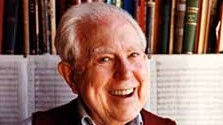
As a freshman in high school, I signed up for an email listserv focusing on 20th century music. Being from a small college town in Indiana, I hadn't had much exposure to classical music written after the Rite of Spring. At this point in my life, I hadn't even really considered the possibility of playing the violin professionally. In fact, my sentiments as recently as a year before would have led me to prefer prioritizing my spot on the wrestling team over playing a note on the violin ever again.
But, around my fifteenth birthday I began discovering music again, and finding that that the weirder it was the more I wanted to hear it. I wanted more than just to know about it, I wanted to "get it". This listserv proved pivotal in my musical development, even if I only followed it for a month and they never discussed much of what I now consider to be truly avante-garde.
A message discussing a disc of Boulez conducting Varese piqued my interest. Who was this Varese guy? However, I quickly found that the headliner of the disc (as far as my project to digest wildly new musical styles was concerned) was clearly the "Symphony of Three Orchestras" by Elliott Carter.
From the devastating Hart Crane quote in the liner notes to the sheer volume of musical ideas bursting from this piece, I knew I had found something I truly did not understand. But, it was a revelation. In not understanding, I saw a vast landscape of music in front of me, shrouded in fog. I couldn't even begin to know where the horizon was.
It was exhilarating to have this work take over my world so completely, with its impossibly expressive lines interacting in ways that never ceased to amaze. Listening to the piece again now, I feel lucky to have found it when I did. Just months later, when my private instructor planted the seed of working to be a professional violinist in my mind, visions of playing new and exciting music inspired me to take on the challenge.
To this day my perceptions of musical expression and time are being influenced and changed by Carter's infinitely subtle and sensitive art. In fact, as this blog post goes live, I will be rehearsing the fourth movement of his Second String Quartet with my mates in Spektral Quartet. Every rehearsal reveals the lines more clearly, hearing how they interact and converse in the most organic, yet unexpected, ways.
Just yesterday, as I walked out of a rehearsal of the quartet, my facebook feed was filled with memorials to Carter and his work. I can think of no more fitting way to find out of his passing than from my peers. His music will be a constant in our lives, an unavoidable pillar of the American canon. I know my story is far from special - many of us were introduced to the deep questioning and probing expression of great new music through Elliott Carter's work.
Old Man and the C: Familiar Territory
Repeating the Performance
Walking on stage at Ripon College's Demmer Recital Hall at 3 PM last Friday, Doyle and I were in good spirits. We had just spent the car ride past Milwaukee and Fond du Lac listening to some wild segments of the Walking the Room podcast and a little Buena Vista Social Club.
Having come in a separate car, Russ and Aurelien arrived a bit later and we got down to the business of getting comfortable in the space. While we bring our own stands to our concerts, the chairs were a little unusual. So, we all sat on big wooden piano benches. (A decision I would later regret when my tailbones were nearly bruised by the end of the show.) I love halls with acoustical curtains, and we were afforded that luxury here, being able to pull them at will.
Once we settled into a sound we liked, sampling large sections of Brahms' A minor Quartet, we covered all the standard spots we like to have in mind for Thomas Ades' Arcadiana and Haydn's Op. 77 No. 2. We know these spots because we've played this program several times before. While this is nothing remarkable to ensembles with more mileage than us, having a run of performances on a major and unchanging program has been a revelation for the comfort level it provides.
In fact, we were so ready for that night that we rehearsed for our following evening's show. We still had some sounds to unify in Marcos Balter's intricate Chambers, so while we had a stage to utilize we figured out our articulations in a rhythmic canon and our bow speeds in an infamous section.
I have to say, that night may not have been the most electricity we've ever had coming from an audience, but it's the most limitless I've found myself to be in performance. We took risks that I would've thought ridiculous just weeks before and didn't fall on our faces. We were able to express the big picture in Brahms while reveling in the details and play whisper-quiet in the Ades.
And the next day we played a wonderfully revised and contrapuntally rich piece in front of a most generous Chicago audience without fear. For us (and the audience members I talked to), Chambers is a work that feels 10 minutes long, but lasts 16. There are few greater compliments for a piece than that. The moving parts all fit into place so snugly and the sounds are so vividly colorful that the ear simply follows along without concern for the passage of time.
But, I'm clearly interested in the passing of time. Things are changing in the way I look at performing with each concert the quartet gives. I'm becoming more aware of the constant learning process that I'm a part of and finding new ways to free my mind to be a part of this ensemble we're building to present on stage.
Plus, what better way to learn how to live the performer's life than keeping yourself awake with the killer dubstep of Skrillex while flying down I-94 to get home from rural Wisconsin?
Ka-li-ma! Ka-li-ma!
I may or may not have recently cursed the name of Marcos Balter in an elaborate and fiery pagan ritual.
You see, he's written these parallel minor sixths that leap up and down the fingerboard in his newly-revised final movement of Chambers.
Commissioned by Spektral, we featured an early draft of this piece on our final concert of last season, and Marcos has been re-working it since. Witnessing this progression of the score is one of the felicities of being a new music player. Concepts transition from interesting idea to captivating sonic endeavor. Corners are navigated more effortlessly and redundancies are trimmed.
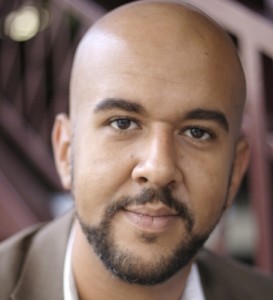 Back to the aforementioned pyre, there is another transition that takes place in this process: that of technical frustrations dissolving. What seems improbable slowly comes into focus as solutions to particularly gnarly passagework emerge. Those dense sixths are still a bear, but as we rehearse, their potency (and deliberateness on the part of the composer) is unearthed.
Back to the aforementioned pyre, there is another transition that takes place in this process: that of technical frustrations dissolving. What seems improbable slowly comes into focus as solutions to particularly gnarly passagework emerge. Those dense sixths are still a bear, but as we rehearse, their potency (and deliberateness on the part of the composer) is unearthed.
What started as a fist shaken at the sky becomes a high five to a wickedly talented composer.
-Doyle
Come see us play Chambers this Saturday night at 8PM in Fulton Hall at the Unversity of Chicago: Concert Details

